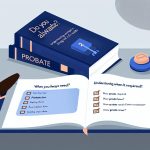Table of Contents

Key Takeaways
- Revocable trusts allow you to modify or revoke the trust during your lifetime, offering flexibility in estate planning.
- They help avoid the probate process, ensuring a quicker and more private distribution of assets.
- Revocable trusts can be altered to accommodate life changes, such as marriage or the birth of a child.
- Assets within a revocable trust remain part of your estate and are subject to inheritance tax in the UK.
- Choosing a reliable trustee is crucial as they will manage the trust according to your wishes.
Understanding Revocable Trusts in Estate Planning
When it comes to securing your financial future and ensuring your assets are managed according to your wishes, revocable trusts play a pivotal role. These trusts offer a flexible approach to estate planning, allowing you to adjust and control your assets while you’re alive.
What is a Revocable Trust?
A revocable trust, often referred to as a living trust, is a legal entity that holds ownership of your assets. The key feature of this trust is its flexibility. You, as the settlor, can modify or even completely revoke the trust during your lifetime. This means you can add or remove assets, change beneficiaries, and make amendments as you see fit.
The beauty of a revocable trust lies in its ability to provide control. You don’t have to worry about losing ownership of your assets. Instead, you maintain authority over them and can decide how they are managed and distributed.
Key Features of Revocable Trusts
One of the most significant aspects of a revocable trust is its flexibility. This type of trust is designed to adapt to your changing circumstances and needs. Whether it’s a change in your family structure or financial situation, you have the ability to adjust the trust accordingly.
Additionally, a revocable trust ensures privacy. Unlike a will, which becomes public record once it goes through probate, the terms of a trust remain private. This means your financial matters and the details of asset distribution are kept confidential.
Revocable vs. Irrevocable Trusts
Understanding the differences between revocable and irrevocable trusts is crucial for making informed estate planning decisions. While a revocable trust offers flexibility, an irrevocable trust does not. Once established, an irrevocable trust cannot be easily altered or revoked.
Here’s a simple comparison: for comprehensive insights on setting up a trust fund in the UK, you can refer to this guide.
| Feature | Revocable Trust | Irrevocable Trust |
|---|---|---|
| Flexibility | Can be changed or revoked | Cannot be easily altered |
| Asset Ownership | Assets remain part of estate | Assets are removed from estate |
| Tax Benefits | Limited tax benefits | Potential tax advantages |
Most importantly, while a revocable trust provides flexibility and control, it does not offer the same level of tax benefits or creditor protection as an irrevocable trust. Therefore, it’s essential to consider your specific needs and objectives when choosing between the two.
Advantages of Revocable Trusts for UK Families
Revocable trusts can be particularly beneficial for families in the UK, providing a means to manage assets efficiently and ensure a smooth transition of wealth.
Asset Management Control
With a revocable trust, you maintain control over your assets. This means you can manage your financial affairs as you see fit, without interference. You have the power to decide how your assets are invested and distributed, ensuring they align with your long-term goals.
Adjusting to Life Changes
Life is unpredictable, and your estate plan should reflect that. A revocable trust allows you to adapt to changes such as marriage, divorce, the birth of a child, or shifts in financial status. You can update the terms of the trust to accommodate these changes, ensuring your estate plan remains relevant and effective.
Privacy and Avoidance of Probate
One of the standout benefits of a revocable trust is its ability to bypass the probate process. Probate can be lengthy, costly, and public. By placing assets in a trust, you can ensure a more private and efficient transfer to your beneficiaries. This not only saves time and money but also keeps your financial matters confidential.
Flexibility Offered by Revocable Trusts
Revocable trusts are a powerful tool in estate planning, primarily because they offer unparalleled flexibility. This flexibility is what makes them particularly appealing to those who want to maintain control over their assets while still planning for the future. With a revocable trust, you can adjust your plans as life changes, ensuring that your estate plan remains aligned with your current circumstances and wishes.
Amending Trust Terms
One of the key benefits of a revocable trust is the ability to amend its terms. Whether you want to change the distribution of assets or update the list of beneficiaries, you can do so with relative ease. This adaptability is crucial in a world where personal and financial circumstances can change rapidly.
For instance, if you initially set up your trust to benefit your children equally, but later decide to allocate more to one child due to their financial needs, you can simply amend the trust. This ensures that your assets are distributed in a way that reflects your current intentions. Learn more about the legal challenges in setting up asset property trusts to make informed decisions.
Changing Beneficiaries
Life events such as marriages, divorces, or the birth of new family members can necessitate changes in your estate plan. With a revocable trust, you can easily update the list of beneficiaries to include or exclude individuals as needed. This ensures that your assets are passed on to the right people at the right time.
Moreover, you can specify conditions under which beneficiaries receive their inheritance. For example, you might want your children to receive their inheritance only after they reach a certain age or achieve a particular milestone. This level of control ensures that your assets are used wisely and in accordance with your wishes.
Revoking the Trust: The Process
In addition to amending terms and changing beneficiaries, a revocable trust allows you to revoke the trust entirely if necessary. This means you can dissolve the trust and regain direct control over your assets without legal complications.
To revoke a trust, you typically need to follow a straightforward process. This involves drafting a revocation document, which clearly states your intention to dissolve the trust. You then notify the trustee and any relevant parties. Once the trust is revoked, the assets are returned to your direct ownership, giving you complete control once again. For more information on the legal aspects, you can explore legal challenges in setting up asset property trusts.
Setting Up a Revocable Trust in the UK
Establishing a revocable trust in the UK involves several important steps. It’s essential to approach this process with care and attention to detail to ensure that the trust is set up correctly and aligns with your estate planning goals.
Selecting a Trustee
The trustee plays a crucial role in managing the trust and ensuring that your wishes are carried out. When selecting a trustee, choose someone you trust implicitly. This could be a family member, a close friend, or a professional trustee service. The key is to select someone who is reliable, financially savvy, and committed to acting in the best interests of the trust and its beneficiaries.
Funding the Trust with Assets
Once you’ve selected a trustee, the next step is to fund the trust. This involves transferring ownership of your assets into the trust. Assets can include real estate, bank accounts, investments, and personal property. It’s important to ensure that all transfers are legally documented and that the trust is properly funded to avoid complications later on.
- Identify which assets you want to include in the trust.
- Consult with legal and financial advisors to ensure proper transfer of ownership.
- Document all transfers and update titles or deeds as necessary.
By funding the trust, you ensure that the assets are managed according to the terms of the trust and that they are distributed as you intend. For more information on setting up trusts, explore the legal challenges in setting up asset property trusts.
Legal Formalities and Documentation
Setting up a revocable trust involves several legal formalities and documentation. It’s advisable to work with an experienced estate planning attorney who can guide you through the process. This includes drafting the trust document, which outlines the terms of the trust, the roles and responsibilities of the trustee, and the distribution plan for the assets. For more insights, explore the legal challenges in setting up trusts.
Potential Considerations and Limitations
While revocable trusts offer numerous benefits, there are also considerations and limitations to keep in mind. Understanding these can help you make informed decisions about your estate plan.
First, it’s important to note that assets within a revocable trust remain part of your estate for tax purposes. This means they are subject to inheritance tax in the UK. While a revocable trust can help avoid probate, it doesn’t necessarily provide tax advantages.
Additionally, setting up and maintaining a revocable trust can incur costs. These include legal fees for drafting the trust document, ongoing administration fees, and potential costs associated with amending or revoking the trust. For more information on the legal challenges involved, you can read about setting up asset property trusts.
Finally, while a revocable trust provides control and flexibility, it may not offer the same level of asset protection as an irrevocable trust. Creditors can potentially access assets within a revocable trust, as they are still considered part of your estate.
“A revocable trust offers flexibility and control, but it’s important to weigh the costs and limitations before proceeding.”
Tax Implications in the UK
When considering a revocable trust as part of your estate planning, it’s crucial to understand the tax implications involved. In the UK, assets within a revocable trust remain part of your estate, meaning they are subject to inheritance tax. This tax is typically charged at 40% on estates valued over the threshold, which is currently £325,000.
While a revocable trust offers many benefits, such as flexibility and control, it doesn’t provide the same tax advantages as an irrevocable trust. Therefore, it’s essential to weigh these factors when deciding whether a revocable trust is the right choice for you.
- Assets in a revocable trust are subject to inheritance tax.
- Revocable trusts do not provide significant tax advantages.
- Consider consulting a tax advisor to explore potential tax-saving strategies.
Understanding these tax implications can help you make informed decisions and optimize your estate plan to minimize tax liabilities.
Comparing Costs with Other Estate Planning Tools
When planning your estate, it’s important to consider the costs associated with different estate planning tools. Revocable trusts can be more expensive to set up and maintain compared to simpler tools like wills. Legal fees for drafting the trust document and potential administration fees can add up.
However, the flexibility and control offered by revocable trusts can often justify these costs, especially if avoiding probate and maintaining privacy are important to you. Comparing these costs with the benefits can help you determine the best approach for your estate planning needs.
Final Thoughts on Revocable Trusts
Revocable trusts offer a unique blend of flexibility and control, making them a valuable tool in estate planning. They allow you to manage your assets according to your wishes while adapting to life’s changes. However, it’s important to consider the costs and tax implications involved.
By carefully weighing these factors, you can determine if a revocable trust aligns with your estate planning goals and provides the financial security you seek for your loved ones.
Role in Comprehensive Estate Planning
Revocable trusts play a crucial role in comprehensive estate planning. They offer a flexible solution for managing and distributing assets, ensuring that your wishes are fulfilled. When combined with other estate planning tools, such as wills and powers of attorney, revocable trusts can create a robust estate plan.
- Provides flexibility and control over asset management.
- Ensures privacy and avoids probate.
- Can be combined with other tools for a comprehensive plan.
By integrating a revocable trust into your estate plan, you can enhance the financial security of your loved ones and ensure a smooth transition of wealth. For further understanding, explore common misconceptions about UK asset property trusts.
Ultimately, the goal of estate planning is to protect your assets and provide for your family. A revocable trust can be an effective tool in achieving this goal, offering peace of mind and financial security for the future.
Empowering Financial Legacy for Families
Creating a financial legacy for your family is one of the most important aspects of estate planning. A revocable trust empowers you to do just that by allowing you to control how and when your assets are distributed.
By setting clear terms and conditions, you can ensure that your wealth is used wisely and benefits your loved ones in the way you intend. This not only protects your assets but also empowers your family to achieve their financial goals and secure their future. For more information, you can explore UK asset protection trusts.
Frequently Asked Questions
What assets can be placed in a revocable trust?
Virtually any asset can be placed in a revocable trust, including real estate, bank accounts, investments, and personal property. The key is to ensure that the ownership of these assets is transferred to the trust properly.
By including a diverse range of assets, you can create a comprehensive estate plan that addresses all aspects of your financial situation and ensures a smooth transfer of wealth.
Can I change my trustee after setting up the trust?
Yes, one of the benefits of a revocable trust is the ability to change the trustee if necessary. This flexibility ensures that you can appoint someone you trust to manage the trust according to your wishes.
To change the trustee, you typically need to amend the trust document and notify all relevant parties. This process is relatively straightforward and ensures that the trust is managed effectively.
“Choosing the right trustee is crucial, but remember, you can always make changes if needed. For more insights, explore the legal challenges in setting up asset property trusts.”
Does a revocable trust protect assets from creditors?
Generally, a revocable trust does not provide protection from creditors. Since the assets remain part of your estate, they can be accessed by creditors if necessary. For greater asset protection, you may need to consider other estate planning tools, such as irrevocable trusts.
It’s important to evaluate your specific needs and consult with legal and financial advisors to determine the best approach for protecting your assets.
- Can You Do Probate Yourself in the UK? Pros, Cons and Common Mistakes – 15 February 2026
- Probate Without a Will: What Happens When Someone Dies Intestate? – 12 February 2026
- The True Cost of Probate in the UK – Fees, Taxes and Hidden Expenses – 9 February 2026






